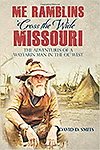Review — ME RAMBLINS ’CROSS THE WIDE MISSOURI by David S. Smits (Guatemala)
 Me Ramblins ‘Cross the Wide Missouri: The Adventures of a Wayfarin Man in the Ol’ West
Me Ramblins ‘Cross the Wide Missouri: The Adventures of a Wayfarin Man in the Ol’ West
by David S. Smits (Guatemala 1963–65)
Peace Corps Writers
2017
500 pages
Reviewed by D.W. Jefferson (El Salvador 1974-76; Costa Rica 1976-77)
•
If most of what you believe you know about American frontier life in the pre-Civil War years is from movies and TV shows, you should definitely read this book. Author David Smitts was a professor of American history, specializing in U.S. westward expansion and the evolving frontier region for 38 years before retiring.
He had often assigned his students to create a fictitious character and insert him or her into authentic events in history based on what primary sources they could find. The character, acting as chronicler, would interact with actual individuals of the time period who should behave in accordance with the historical record. The completed project would take the form of either a series of letters or a journal. In retirement, Smitts decided to tackle this same sort of project. The result is Me Ramblins ‘Cross the Wide Missouri, a fictitious memoir based on the historical record of nineteenth-century events in the trans-Mississippi West.
Because, as the author puts it, “I have tried to sing the song of the Old West by relying heavily on its own unique and colorful lyrics,” the book is written in a slang-English dialect reflecting how a semi-educated person of the period might have spoken and written. Reading text written in dialect can be challenging, and I found it so. I discovered that reading aloud a sentence or paragraph I was struggling with invariably allowed me to figure out its meaning!
Considering this work as a potential high school or college text, I would identify two trigger warnings. The first is the use of slang expressions common at the time, but since labeled as offensive. For example Injuns, savages, Greasers and coons. The second is the explicit descriptions of sexual behavior of the narrator with various partners. Arguably the sex is not essential to the rest of the historical narrative.
The author’s honest and realistic view of the history of the western frontier, based on primary sources, is very much worth the effort to read this book. His inclusion of the perspectives of such often ignored groups as Native Americans and Mexicans is much needed.
However, if the chronicler’s voicing of the prevailing attitudes, assumptions and anxieties of the historical time period deeply offends you, you should probably find an alternative treatment of the nineteenth-century in the trans-Mississippi West instead of Me Ramblins.
•
A blog about reviewer Dean Jefferson’s Peace Corps years is at Blogspot “Peace Corps Journal (El Salvador & Costa Rica)”. He is currently retired from a career in computer software engineering.
No comments yet.
Add your comment